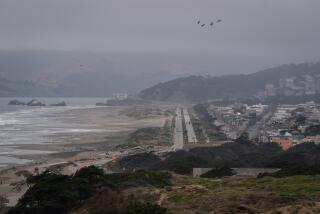China Debates Special Tax Breaks Given to Coastal Zones : Economy: Critics say Deng’s policy of boosting investment in five areas breeds division, inequity.
- Share via
BEIJING — Communist Party leaders will be confronted with growing dissension over regional inequities in the Chinese economy this week when they meet here to approve the country’s economic game plan for the next five years.
A rare public debate on the issue erupted this summer when a Beijing economist appealed for an end to special tax treatment given to five booming coastal areas in southern China. Preferential tax rules in the “special economic zones” have created an unfair coastal tilt to China’s economy that threatens to split the country and sap the strength of the central government, said Hu Angang.
His comments sparked a furor in southern Guangdong province, where a senior Communist Party official accused Hu of violating the teachings of paramount leader Deng Xiaoping, the main patron of the special economic zones.
All summer long the debate has raged, culminating last month at the beach resort of Beidaihe, about 150 miles east of Beijing, where party leaders hold their annual retreat. According to reports in the Chinese press, the unequal rates of development between China’s coast and its vast interior dominated discussions among the swimsuit-clad party elders meeting in colonial-era villas on the coast of the Yellow Sea.
Some indication of what the leadership plans to do about the problem is expected to emerge when the 200-member party Central Committee meets Monday and Tuesday in Beijing to approve China’s ninth Five-Year Plan. The plan will chart China’s economic goals to the end of the century.
The big unanswered question is whether party officials will remove tax advantages enjoyed by Shenzhen, Zhuhai, Shantou, Xiamen and Hainan, areas that have set the pace for double-digit economic growth over the past decade. Tax rates for foreign firms that invest in the five areas are less than half--15% compared to 33%--those in the rest of the country.
As a result, the five zones, three of which are in Guangdong province, have attracted almost one-fourth of all foreign investment in China. According to the Singapore-based Institute of East Asian Political Economy, the Chinese economy grew at a rate of 13% in 1993, but the economies in the five special zones grew at a rate of more than 20%.
The special economic zones bear Deng’s personal stamp of approval.
Now that Deng is 91 and in failing health, the five areas have become the focus of attacks from an emerging wing of Chinese politics. Sometimes dubbed “new authoritarians,” they fear an erosion of the central government’s authority because of decentralization that occurred under Deng.
Beijing economist Hu, 42, a leader in the movement--although he rejects the “new authoritarian” title--contends that tax breaks enjoyed by the special economic zones exacerbate regional inequalities and rob the central government of billions of yuan in revenue. At the current exchange rate, the yuan is worth about 12 cents.
Hu also says income disparity in China is growing at a dangerous rate, producing volatile economic class divisions. The per capita income in the special zones, he contends, is already seven times higher than the national average and 14 times higher than that of the interior provinces.
In a forceful reaction, Li Youwei, Communist Party secretary in Shenzhen, the booming industrial area just across the border from Hong Kong, contended that removing the tax benefits would, in effect, abolish the zones altogether. This would run counter to the Deng principle of “letting localities where conditions permit to develop first,” Li told the official Shenzhen Special Zone Daily.
Allowing the coastal areas to develop will speed development of the western interior, he said.
The only hint of what the Communist Party Central Committee plans to do came in a brief outline of the proposed Five-Year Plan published in the official press. In the outline, the Chinese state promised “to provide more financial resources and project finance facilities to the inland areas.”
But supporters of coastal special economic zones received a moral boost last week when Jiang Zemin, the Chinese president and party general secretary, spoke in favor of preferential tax benefits for investors in Pudong, the industrial park area across the Huangpu River from Shanghai.
“They didn’t announce it as such,” said Lu Ning, a journalist with the Singapore Business Times newspaper, “but they were in effect creating Pudong as a new special economic zone.”
More to Read
Sign up for Essential California
The most important California stories and recommendations in your inbox every morning.
You may occasionally receive promotional content from the Los Angeles Times.













